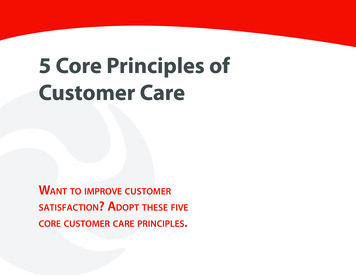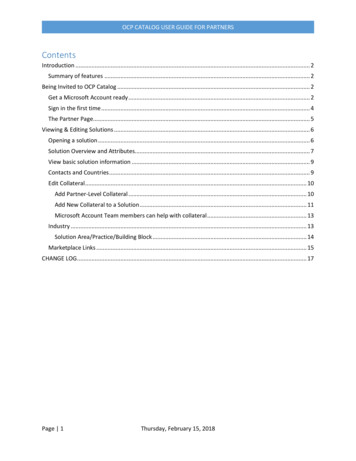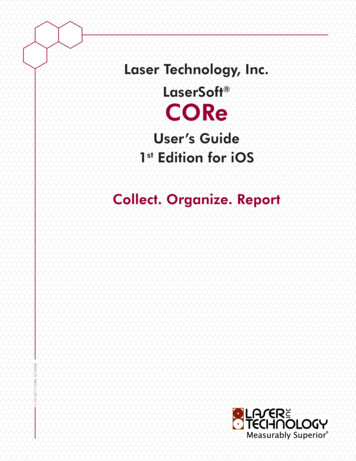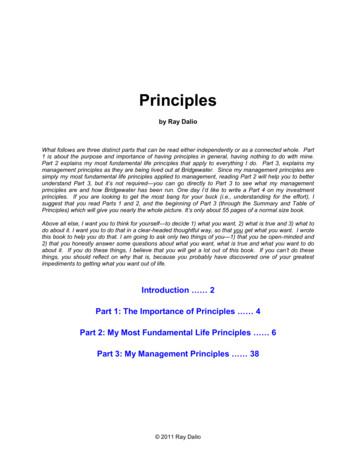
Transcription
5 Core Principles ofCustomer CareWant to improve customersatisfaction? Adopt these fivecore customer care principles.
OverviewWhat company isn’t looking to improve customer satisfaction in today’s highly competitivemarketplace? Customers who give you a 5 on a scale of 1 to 5 are six times more likely to buyfrom you again than those who “only” give you a score of 4.8. Customers are the lifebloodof an organization. Their satisfaction is closely linked to retention (and its less attractive sibling, churn),repeat business, and the positive word of mouth that attracts new customers.To satisfy customers, you simply have to resolvetheir issues and do it quickly. Easier said than done.At minimum, customers expect to be listenedto and understood, taken seriously, treated withrespect, and to receive timely action. To earn topNet Promoter scores or 5s on a CSAT survey, youhave to do more.In this eBook, we’ll talk about some core principlesof customer care that drive strong customersatisfaction scores. There are, of course, essentialskills that should be demonstrated by anyone in a frontline customer service position, and ImpactLearning Systems has a lot of information to offer you in that arena. But for now, our focus is on five keyprinciples that are relevant to anyone who manages or trains a customer service team. Copyright 2014, Impact Learning Systems International—a division of Miller Heiman1
IntroductionThe following principles derivefrom work performed with manyorganizations to assist them in theirefforts to establish a culture of worldclass service. The principles outlinedhere are key to that endeavor—regardless of industry. Of course it’sdifficult to pare it down to only fiveprinciples—certainly there are manymore that can be considered—butthis should provide a good startingpoint for anyone trying to build and maintain a strong customer care culture in theirown organization.Did You Know?!If you can resolve an issue orfix a problem of a complainingcustomer, it is 80% likely thatthe customer will come backand make a purchase again. Copyright 2014, Impact Learning Systems International—a division of Miller Heiman2
“Customer Care” DefinedThe concept of “customer care” needs to bedistinguished from “skills.”There are some essential skills that should be demonstrated by anyone in a frontlinecustomer care position, and Impact Learning Systems certainly has a lot of informationto offer you in that arena, but for now, let’s focus on some key principles that arerelevant to anyone who manages or trains a customer care team, as well as to thecustomer care representatives themselves.After each principle, some relevant questions to reflect on will be introduced. Theaim is to help you assess whether this principle is being put into practice in your ownorganization. Let’s take a look.Customer Care(noun) The work of lookingafter customers and ensuringtheir satisfaction with yourbusiness and its goods orservices. Copyright 2014, Impact Learning Systems International—a division of Miller Heiman3
Customer Care Principle #1The first principle is that to customers, frontline representatives are the company. Customersdon’t usually know or see what goes on behind the scenes, so their impression of your organization stems from whatwe call “customer touchpoints.” These customer touchpoints occur any time a customer comes into contact withyour company and uses that experience to form an impression of your organization.Frontline employees, whether they’re communicating face-to-face, on the telephone,or via e-mail, are in direct and constant communication with your customers. Aninvestment in the skills and knowledge of these employees is very much an investmentin the customer experience.To ensure that these customer touchpoints are leaving a favorable impression, hereare a few questions for you to consider: Do frontline employees view themselves as ambassadors of theorganization? Are they trained in communication skills? Are they empowered to do the needful (within reason) for customers? Are you aware of the various customer touchpoints that occur in yourorganization? Copyright 2014, Impact Learning Systems International—a division of Miller Heiman4
Customer Care Principle #2Studies have shown that a strong link exists between employees’ job satisfaction and the quality of customerservice those employees provide. (Really no surprise there.) Customer care—whether that means selling shoes orfixing servers—is an intrinsically rewarding profession. Simply put, it feels good to be of service to someone, tomake something good happen to another person. This is the kind of attitude that motivates employees to create astrong culture of customer care. But it doesn’t typically happen unless the employees themselves feel valued by theircompany and satisfied with their jobs. It may sound obvious, but it’s worth noting:If employees aren’t satisfied on the job, they’re usually not motivated todemonstrate a high level of customer care.At best, they’ll do just enough to get by.The following are some key questions to ask yourself about employee satisfaction at your organization: What is the turnover rate for your customer-facing employees? How do you measure employee satisfaction and motivation? When employee satisfaction is low, what do you do about it? Do performance issues in your organization stem from an employee’s attitude or from his or herskill level?Your answers to these questions will tell you what’s needed in order to build a culture of strong customer care. Copyright 2014, Impact Learning Systems International—a division of Miller Heiman5
Customer Care Principle #3The third key principle of customer care is tocompany.show customers that they’re valued by yourMany organizations make the mistake of assuming that customers know this. Of course, the mostimportant aspect of showing customers that they’re valued is to take care of their needs or requests in a timely,efficient, and correct manner. At each and every customer touchpoint, maintain a mindset of earning the businessand trust of customers. Never take it for granted.But customers have needs that go beyond the transaction. They want to be appreciated and respected. They wantto feel that your company’s customer care philosophy is just that: Care. So it doesn’t hurt to tell them directly. Beforeending a call or a face-to-face visit, employees should take a moment to tell the customer that their business isappreciated. It can go a long way.Here are three questions to keep in mind: If you were a customer of your organization, would you feel valued? When closing a call or other type of customer transaction, are employees expected to thankcustomers for their business? Do customer-facing employees understand the importance of earning a customer’s trust andloyalty on an ongoing basis?The good news is, putting this principle into action is usually a pretty simple step. Copyright 2014, Impact Learning Systems International—a division of Miller Heiman6
Customer Care Principle #4All too often, companies place a strong emphasis on externalcustomer care while losing sight of the fact thatcustomers matter just as much.internalWhy? Becausesomewhere down the line, the service you provide to an internalcustomer will show up in an external customer transaction. Aninternal customer is any employee who depends on the timing,quality, and accuracy of your work in order for them to succeedin their own work. Those organizations in which a customercare culture is truly embedded do not make distinctions aboutinternal and external care. Each employee’s mission is simply todemonstrate excellence with each and every task.To help you assess the level of internal customer service in your organization, ask yourself the following questions: Do your employees know who their internal customers are? Are employees measured on the service they provide to internal customers? Do they recognize that everyone in the organization is a service provider?If you feel that you might need work in any of these areas, the next principle can help. Copyright 2014, Impact Learning Systems International—a division of Miller Heiman7
Customer Care Principle #5You cannot expect people to perform to expectations until you’ve giventhem the knowledge and skills to do just that. If you’re serious aboutembracing a culture of customer care, you need toeducate employees as to what this notion looks likeon the job. It shouldn’t be taken for granted that employees know whatgoes into good customer service—internal or external. They may have somegood instincts, and they may each take certain measures that they personallyfeel will provide good service, but this hopeful and hodgepodge approachisn’t enough. Providing them training in both your company’s customer carephilosophy and in their job-specific service skills is a huge and all-importantstep. Once employees have been trained, it’s essential for them to be held accountable for putting the skills intopractice on the job. This, of course, means strong and consistent coaching on an ongoing basis.Finally, once you’ve trained employees and held them accountable for putting their training into practice on the job,be sure to reward them for their success. Copyright 2014, Impact Learning Systems International—a division of Miller Heiman8
Formula for SuccessHere at Impact Learning Systems, we believe that strong performance in the area of customer care is a matter of asimple formula:Training Coaching SuccessThe questions that follow will help you to assess where you stand in those twodisciplines: Do employees know what’s expected of them? Do they have the knowledge, skills, and competencies to provide greatservice to internal and external customers? Do supervisors and managers provide regular, constructive, and skilledcoaching to employees? Are employees rewarded for their success?If your answer to any of these questions is no, it’s time to take a look at your training andcoaching and possibly move them up the priority list. Copyright 2014, Impact Learning Systems International—a division of Miller Heiman9
SummaryTo recap, the five customer care principles discussed are as follows:Principle #1:To customers, frontline employees are the company.Principle #2:Employee satisfaction matters!Principle #3:Show customers they’re valued. Don’t assume they know it.Principle #4:Internal customer care is as important as external customer care.Principle #5:Train your staff to deliver great service—and hold them accountable.If you’d like more information on strengthening the level of customer care offered by your organization, please giveus a call at 800-545-9003. We’ll be happy to help. Copyright 2014, Impact Learning Systems International—a division of Miller Heiman10
Learn more.Impact Learning Systems offers customized programs andcourses specific to increasing customer satisfaction for alllevels of support—from call center coaches to technical serviceteams.See for yourself the difference that increased customer satisfaction can have on your salesnumbers, customer retention, and employee satisfaction rates.Learn more about our leading customer satisfaction training programs, and read morecase studies from companies that have found success with our training programs. http://www.impactlearning.com Copyright 2014, Impact Learning Systems International—a division of Miller Heiman11
Principle #1: To customers, frontline employees are the company. Principle #2: Employee satisfaction matters! Principle #3: Show customers they're valued. Don't assume they know it. Principle #4: Internal customer care is as important as external customer care. Principle #5: Train your staff to deliver great service—and hold them accountable.










